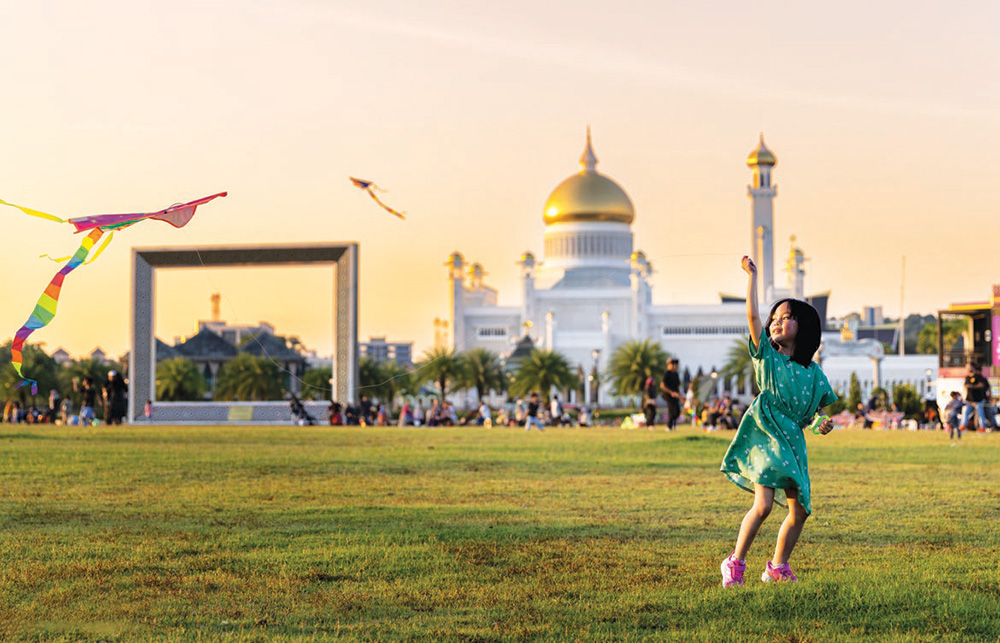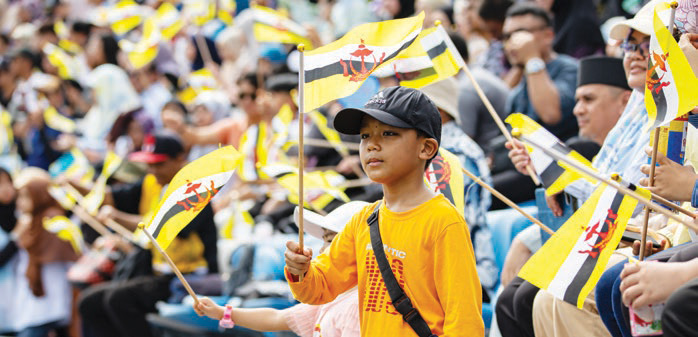The Abode of Peace

Situated along the northwest coastline of Borneo, Brunei Darussalam is a tranquil nation with a modest size of 5,765 square kilometres located on the northern side of Borneo Island. Brunei shares borders with the Malaysian state of Sarawak and is divided into two parts. The west enclave holds Brunei-Muara, Tutong and Belait districts, whereas the east enclave holds Temburong District.
As an equatorial country, Brunei has high rainfall and warm temperatures all year round. There is no distinct rainy season, though the period from November to March tends to bring heavier rainfall. Brunei’s economic success was primarily driven by the oil and gas industry, which accounts for over half of its gross domestic product (GDP) and 90 per cent of its exports. The country is home to some of the biggest oil fields and natural gas reserves in Southeast Asia. In order to reduce its dependence on the oil and gas industry, the government has introduced policies and initiatives to nurture other industries and diversify economic growth. Diversification of the economy has gradually been growing in fields of aquaculture, finance and tourism, among others.
Brunei is governed according to the constitution and national ideology of the Malay Islamic Monarchy (MIB). The country’s official religion is Islam but other religions may be practised in peace and harmony by the persons professing them as stated in the Constitution of Brunei Darussalam.
The country’s population is ethnically diverse and has a reputation of being hospitable and accommodating among locals and to visitors alike. Most of the population are Malays, divided into seven ethnic groups: Melayu Brunei, Kedayan, Dusun, Tutong, Belait, Murut and Bisaya. The remaining population is made up of Chinese, Indians and various communities with diverse backgrounds and faiths that blend harmoniously into the Bruneian society. The Abode of Peace is an apt name for Brunei as the country is embraced by the hands of peace, stability and security.
Flag & Crest

The Brunei Darussalam flag has been in use since 1906 when the Sultanate signed the Supplementary Agreement with Britain. The colours in the flag represent the signatories of the agreement: yellow for the Sultan, white for the Pengiran Bendahara and black for the Pengiran Pemancha. The yellow serves as a backdrop with two wide stripes of black and white across it diagonally. A red state crest, added in 1959, sits in the centre of the flag. Prior to 1906, individual flags or personal standards were very much in use. Of the personal standards, those of the Sultan and the Wazirs were the most important. The Sultan also bestowed personal flags to lesser officials known as Pengiran Cheterias and Pengirans as well as other rakyat (subjects).
After the adoption of the State Flag, flags already in existence continued to be in use and flown on state occasions to distinguish individual ranks. The new State Flag was flown only at government buildings and by non-Brunei residents of the state. The use of flags was consolidated after the promulgation of the Constitution in 1959. With the exception of those specially authorised by the Sultan to retain their personal standards, the individual flags of the rakyat and the lesser Pengirans were abolished.
The National Crest consists of:
• The Bendera (flag)
• The Payung Ubor-Ubor (the royal umbrella)
• The Sayap (wing of four feathers) which signifies the protection of justice, tranquillity, prosperity and peace
• The Tangan (hands) represents the government’s pledge to promote welfare, peace and prosperity
• The Bulan (crescent) which symbolises Islam – the national religion of Brunei The Arabic characters inscribed on the crescent read “Always in Service with Allah’s Guidance”, while the words on the scroll mean “Brunei, the Abode of Peace”.
